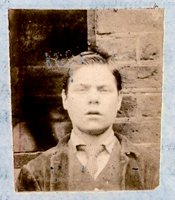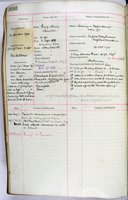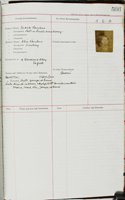 In 1788, a group of gentlemen, worried by the large number of homeless children in London who could earn their living only through begging or crime, established the Philanthropic Society. The Society began by placing one child out to nurse and, by 1792, it was maintaining several 'families' of children, cared for and trained by craftsmen and their wives, in rented houses. In the same year, the first central institution of the Society was opened at St George's Fields in Southwark. It was intended for the sons and daughters of convicts, and boys and girls who had themselves been convicted of crime. In 1802, a separate 'Reform' was opened for the criminal boys and the main institution was afterwards known as the 'Manufactory', since the boys were principally engaged in the manufacture of clothes, shoes, rope and other items. The Female Reform, although on the same site, was completely segregated; this was closed in 1845. The Society was incorporated by Act of Parliament in 1806 (46 Geo.III c.144). In 1848, a decision was taken to move the institution to the country and an estate at Redhill was purchased. The boys-only Farm School opened in 1849.
In 1788, a group of gentlemen, worried by the large number of homeless children in London who could earn their living only through begging or crime, established the Philanthropic Society. The Society began by placing one child out to nurse and, by 1792, it was maintaining several 'families' of children, cared for and trained by craftsmen and their wives, in rented houses. In the same year, the first central institution of the Society was opened at St George's Fields in Southwark. It was intended for the sons and daughters of convicts, and boys and girls who had themselves been convicted of crime. In 1802, a separate 'Reform' was opened for the criminal boys and the main institution was afterwards known as the 'Manufactory', since the boys were principally engaged in the manufacture of clothes, shoes, rope and other items. The Female Reform, although on the same site, was completely segregated; this was closed in 1845. The Society was incorporated by Act of Parliament in 1806 (46 Geo.III c.144). In 1848, a decision was taken to move the institution to the country and an estate at Redhill was purchased. The boys-only Farm School opened in 1849.
 The records of the Royal Philanthropic Society are held at Surrey History Centre, and the Registers of Admissions are particularly interesting since they give wonderfully detailed accounts of the boys and girls admitted to the institution including, in some cases, photographs. In addition to the circumstances of their being admitted, there are descriptions of their physical attributes, details of their birth and baptism, and often references to the next of kin, home addresses and the circumstances of both the children and parents. There are also later additions made which can chart the progress made by boys apprenticed to trades or sent to sea, or even when they emigrated to Canada and Australia. Many boys joined the army or navy, and there are occasionally references to the regiments or ships they joined. An index to the admission registers, 1788 to 1906, is available online.
The records of the Royal Philanthropic Society are held at Surrey History Centre, and the Registers of Admissions are particularly interesting since they give wonderfully detailed accounts of the boys and girls admitted to the institution including, in some cases, photographs. In addition to the circumstances of their being admitted, there are descriptions of their physical attributes, details of their birth and baptism, and often references to the next of kin, home addresses and the circumstances of both the children and parents. There are also later additions made which can chart the progress made by boys apprenticed to trades or sent to sea, or even when they emigrated to Canada and Australia. Many boys joined the army or navy, and there are occasionally references to the regiments or ships they joined. An index to the admission registers, 1788 to 1906, is available online.
 Like many societies which sought to reform young criminals, there was a desire to remove the boys from a background which it was felt contributed towards their descent into a world of crime, begging and general lawlessness. Until the late 1930s (and the outbreak of the Second World War) the society encouraged as many as possible of its boys to emigrate, rather than face unemployment and the consequent temptation to relapse into crime. At first most were sent to Australia, but later the majority went to Canada and some to South Africa, because the passage was cheaper.
Like many societies which sought to reform young criminals, there was a desire to remove the boys from a background which it was felt contributed towards their descent into a world of crime, begging and general lawlessness. Until the late 1930s (and the outbreak of the Second World War) the society encouraged as many as possible of its boys to emigrate, rather than face unemployment and the consequent temptation to relapse into crime. At first most were sent to Australia, but later the majority went to Canada and some to South Africa, because the passage was cheaper.
The surviving letter books also make fascinating reading as 'old boys' write from all over the world to keep in touch with the school and make reference to other boys who are in the same area. Some betray homesickness and several of the Canadian letters comment on the extremes of weather encountered in the huge open spaces of the pioneer farming communities.
The records for the Royal Philanthropic are a genealogist's delight and go to prove that a Black Sheep in the family can be a positive addition to a family tree!
For a full history of the society and the online catalogues see 2271, 2524, 3521, 3741 , 3998, 4261, 7363 and CC115/4/16a.
Images above
Pages and photograph from an Admission Register for the Royal Philanthropic School in Redhill. George Henry Lambert had been sent to the school following a conviction for stealing a copper urinal! In 1906 he emigrated to Canada. According to the Canadian Passenger Lists (Ancestry) he arrived at Halifax Nova Scotia on route to Winnipeg on 19 March 1906. We lose sight of him in Canada and this may have been because he changed his name. Despite the glowing testimonials from the letter books, many children who emigrated to Canada suffered from the stigma of being a 'Home Child' and did their best to hide their origins. (reference 2271/10/23) Please click on the images to enlarge them.
Letter book
 Page from the letter book for the Royal Philanthropic Society. Letter received 19 April 1866 from J Waterhouse in Canada. He is happy in his position and his employer has been "...very kind to me". He lives close to some of his school mates and hopes, "...I may always have a good life as since I left England". (reference 2271/33/2)
Page from the letter book for the Royal Philanthropic Society. Letter received 19 April 1866 from J Waterhouse in Canada. He is happy in his position and his employer has been "...very kind to me". He lives close to some of his school mates and hopes, "...I may always have a good life as since I left England". (reference 2271/33/2)
 Page from the letter book for the Royal Philanthropic Society. Letter received 18 March 1869 from William Lockyer in Canada. He lists his fellow school mates, noting that one of them "...has bought a farm and lives like a gentleman". He hopes to go to America where he can earn more money and reports that "I am growing like a currant bush and am as fat as a pig" (reference 2271/33/2)
Page from the letter book for the Royal Philanthropic Society. Letter received 18 March 1869 from William Lockyer in Canada. He lists his fellow school mates, noting that one of them "...has bought a farm and lives like a gentleman". He hopes to go to America where he can earn more money and reports that "I am growing like a currant bush and am as fat as a pig" (reference 2271/33/2)

